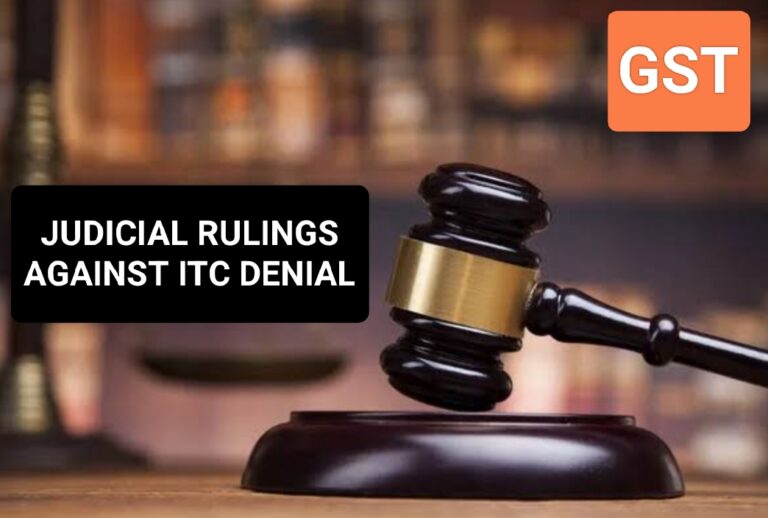Input Tax Credit (ITC) is the cornerstone of India’s Goods and Services Tax (GST) regime. It ensures that taxes paid on inputs can be offset against tax liability on outputs, thereby avoiding tax cascading and encouraging transparency in the value chain. However, businesses often face legal hurdles due to complex interpretations, procedural nuances, and departmental scrutiny.
This article delves into recent landmark GST case laws on ITC denial, offering real-world insights, judicial reasoning, and actionable takeaways for businesses striving to ensure GST compliance and safeguard their ITC claims.
Case 1: Substantive Compliance vs. Procedural Lapses
Case: Supreme Court Dismisses GST Department Appeal
Facts: A taxpayer was denied ITC due to minor procedural errors, despite satisfying all substantive conditions under GST law.
Legal Issue: Can ITC be denied solely for procedural non-compliance, even when all material conditions are met?
Judgment: The Supreme Court upheld the High Court’s view that procedural lapses should not overshadow genuine compliance.
Key Takeaway: Substantive compliance trumps minor procedural errors. Businesses should focus on fulfilling core conditions like valid invoices, receipt of goods, and tax payment, even if procedural defects arise.
Case 2: Retrospective Cancellation of Supplier Registration
Case: Delhi High Court Judgment
Facts: The taxpayer claimed ITC for purchases made from a registered supplier. Later, the supplier’s GST registration was canceled retrospectively.
Legal Issue: Is ITC claimable if the supplier’s registration is canceled post-transaction?
Judgment: ITC cannot be denied for genuine transactions completed before the retrospective cancellation of the supplier’s GSTIN.
Key Takeaway: Bona fide purchasers are protected. Maintain valid purchase documentation and verify supplier status at the time of transaction.
Case 3: ITC as a Vested Right
Case: Calcutta High Court Landmark Ruling
Facts: Tax authorities attempted to revoke already accrued ITC without following due process.
Legal Issue: Is ITC a vested right once it has been legally availed?
Judgment: ITC is a vested right under the GST framework and cannot be withdrawn arbitrarily. Authorities must follow due process.
Key Takeaway: Defend your ITC claims legally. ITC, once legitimately availed, has strong legal protection.
Case 4: GSTR-2A vs. GSTR-3B Mismatch
Case: Calcutta High Court on Return Mismatches
Facts: Discrepancies between GSTR-2A (auto-populated from suppliers) and GSTR-3B (self-declared) led to ITC denial.
Legal Issue: Should clerical mismatches in returns result in ITC disallowance?
Judgment: ITC should not be denied if discrepancies are unintentional and there’s no fraudulent intent.
Key Takeaway: Reconcile returns regularly. But ITC can be defended in cases of genuine mismatch.
Case 5: Section 16(4) and Timely ITC Claims
Case: Supreme Court Clarification on ITC Time Limits
Facts: Taxpayers claimed ITC beyond the deadline prescribed under Section 16(4) of the CGST Act.
Legal Issue: Can ITC be availed after the statutory deadline?
Judgment: Courts emphasize adherence to timelines. However, relief may be granted in genuine hardship cases.
Key Takeaway: Respect statutory deadlines. Timely filing is essential to secure ITC benefits.
Case 6: Vidya Drolia vs. Union of India
Facts: The taxpayer’s ITC was denied due to cancellation of the supplier’s registration post-transaction.
Legal Issue: Should ITC be disallowed for genuine past transactions because of later supplier irregularities?
Judgment: The Supreme Court ruled that legitimate ITC claims cannot be nullified due to supplier deregistration occurring after the transaction.
Key Takeaway: Taxpayers cannot be penalized for supplier faults beyond their control, especially post-transaction.
Other Notable Judgments on GST ITC Denial
A. Supplier’s Non-Payment of GST – Madras High Court
-
Finding: ITC cannot be denied to a genuine buyer merely because the supplier failed to deposit tax.
-
Implication: Buyers are not responsible for suppliers’ tax defaults if due diligence is shown.
B. Burden of Proof – Supreme Court
-
Finding: The onus lies on the taxpayer to substantiate ITC claims with appropriate documents.
-
Implication: Keep all relevant records—tax invoices, payment proofs, and delivery documents.
C. Valid Transactions Despite Supplier Deregistration – Supreme Court
-
Finding: Legitimate transactions remain valid even if the supplier’s registration is later canceled.
-
Implication: Reinforces the need for supplier due diligence but offers protection for completed transactions.
Conclusion: Strengthening ITC Claims Under GST
The judicial trend clearly emphasizes fairness, bona fide conduct, and due process in ITC matters. As GST litigation evolves, the following best practices can help businesses stay compliant and minimize litigation risk:
-
✅ File timely ITC claims under prescribed timelines.
-
✅ Verify supplier GST registration before transactions.
-
✅ Maintain robust documentation—invoices, delivery challans, and proof of payments.
-
✅ Reconcile GSTR-2A and GSTR-3B regularly to avoid discrepancies.
-
✅ Defend against arbitrary ITC denial through legal recourse where necessary.
With courts increasingly favoring genuine taxpayers, businesses that operate transparently and document diligently can effectively safeguard their Input Tax Credit rights under GST.
